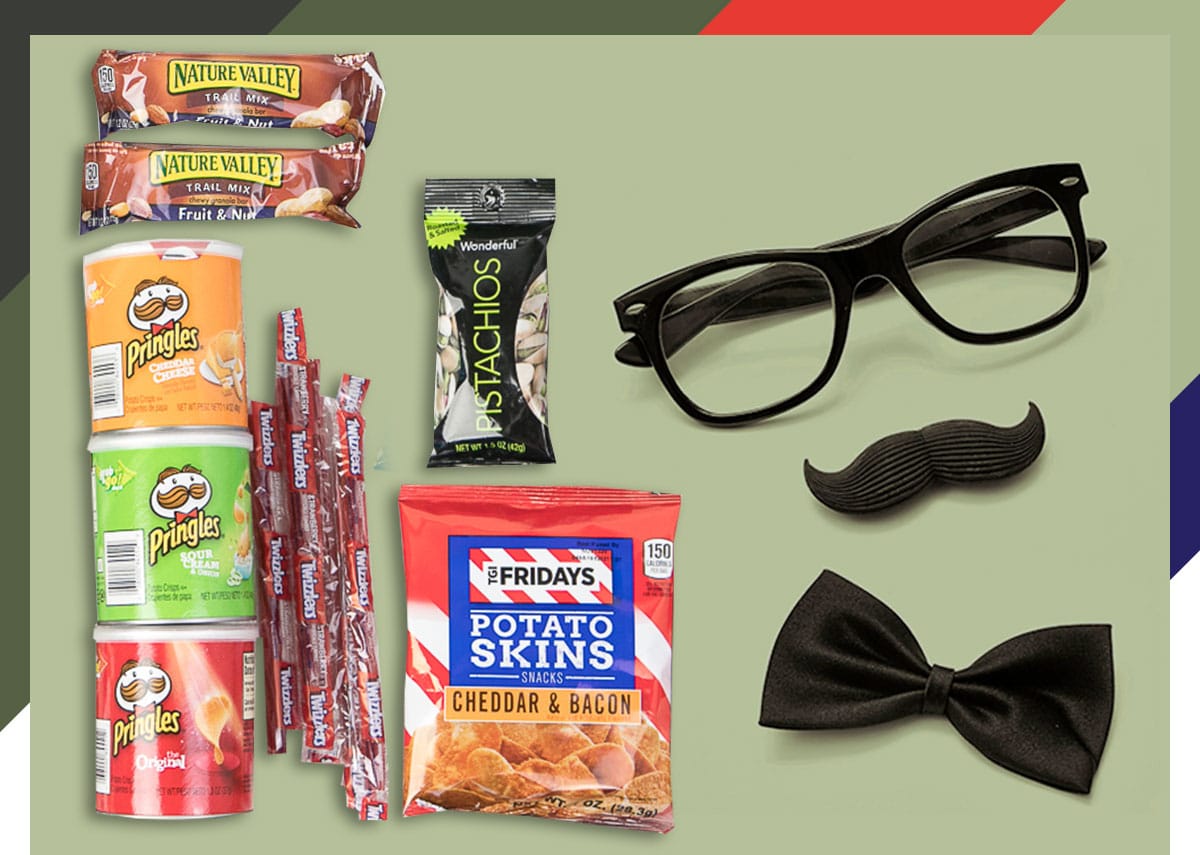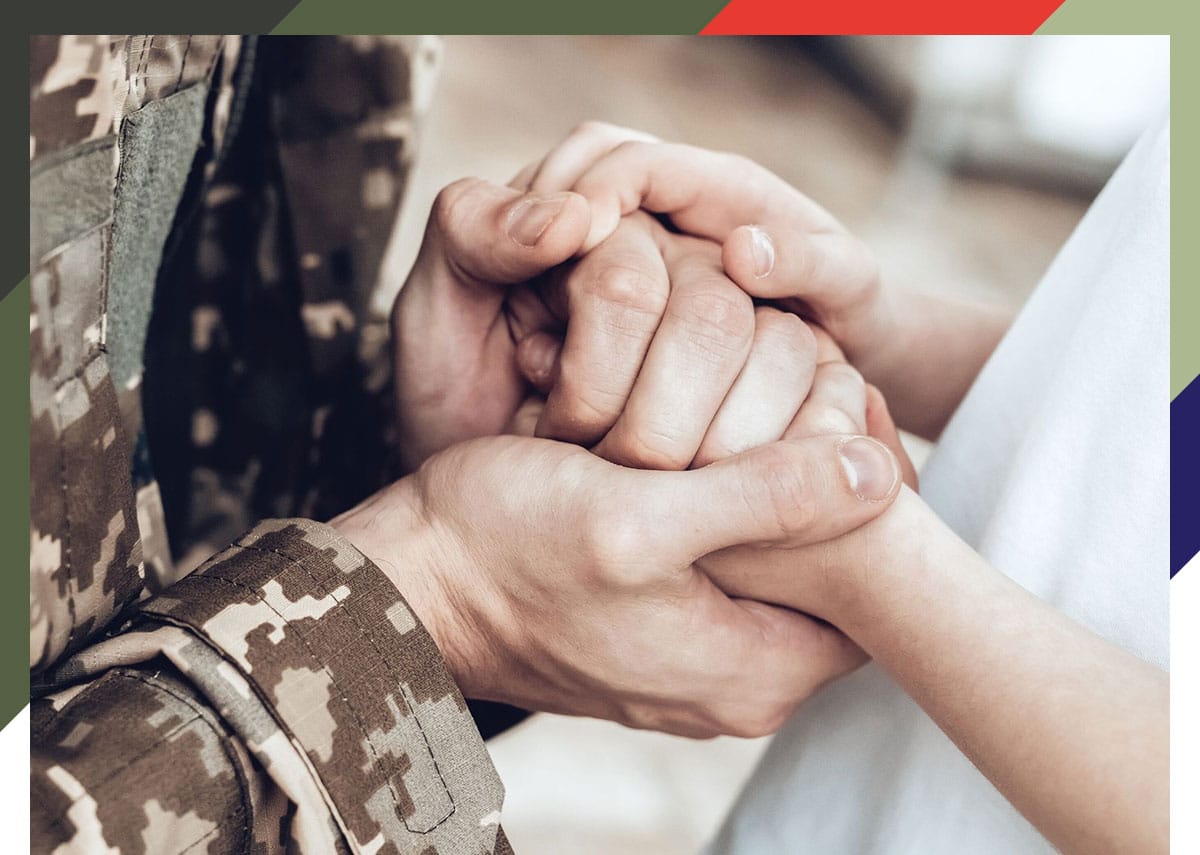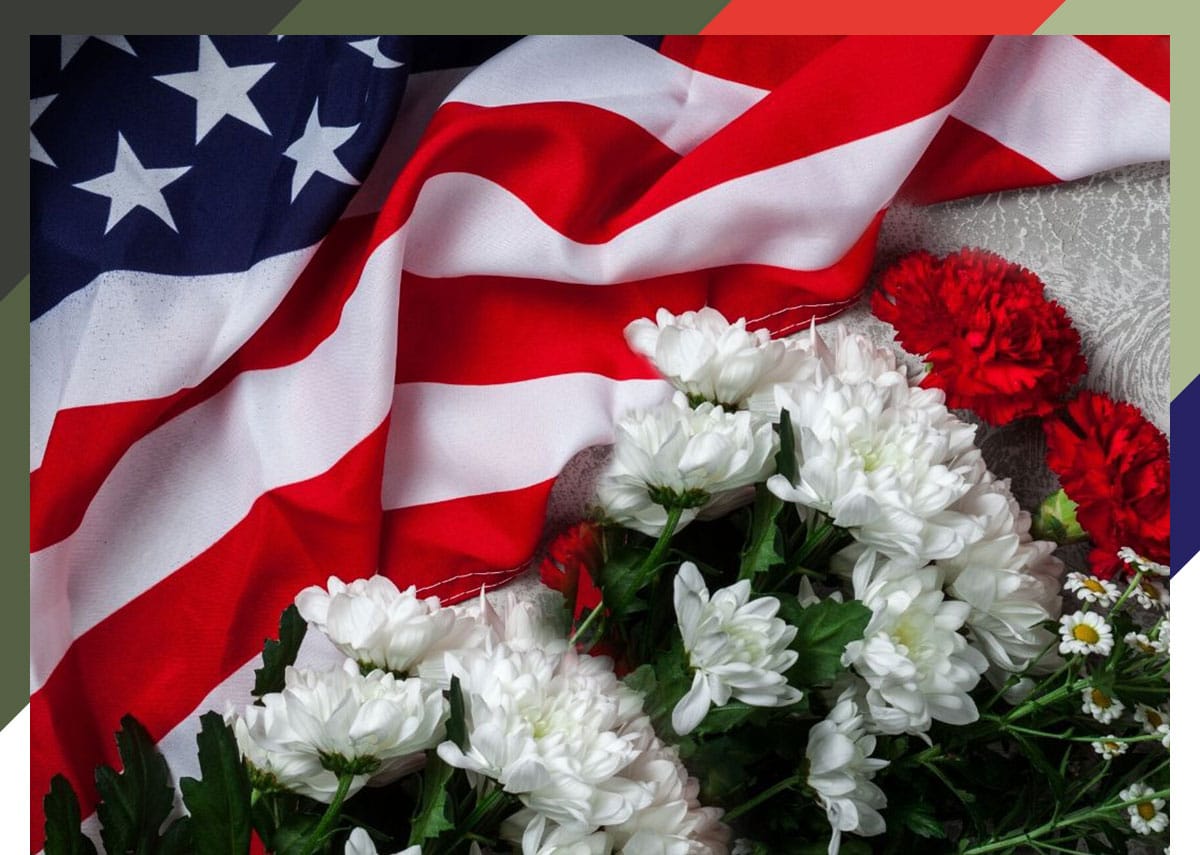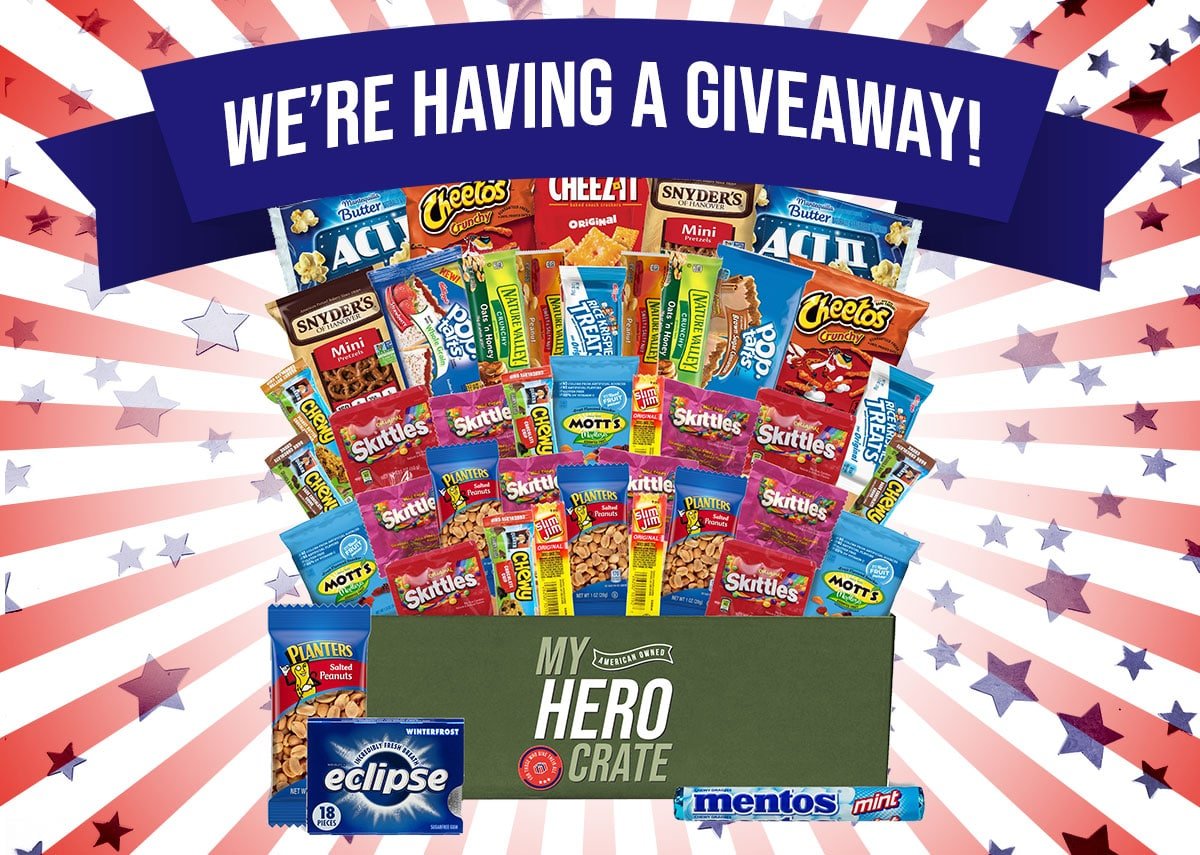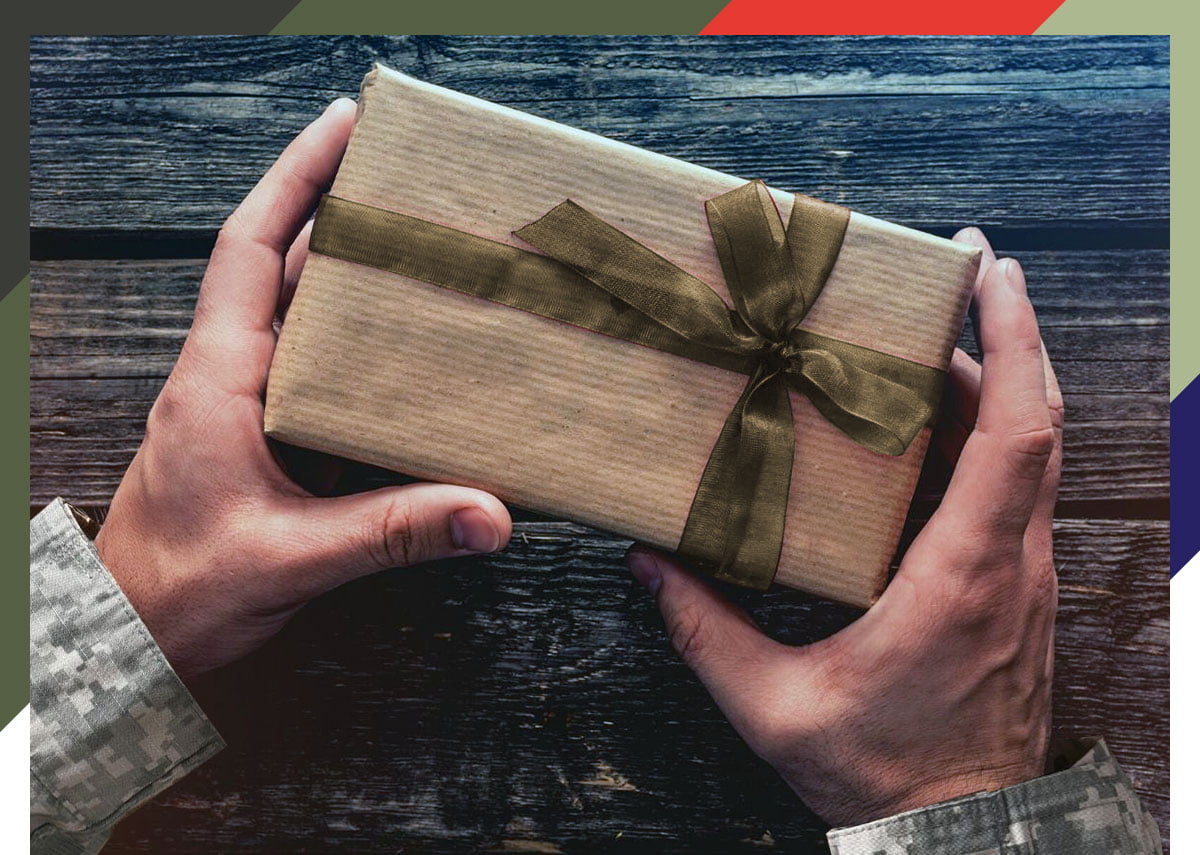For military families, Mother’s Day and Father’s Day are sometimes two of the most heart-wrenching holidays, especially when you have to spend it away from your loved one. When you do get to spend the holiday together, it’s even more meaningful.
For a veteran dad, consider giving armed forces memorabilia as a special Father’s Day gift. Pennants, shirts, baseball caps, and even replica statues of military or historical figures they look up to can make heartfelt gifts. A license plate frame with their branch of the military on it would look great on your dad’s civilian car, too.
Give your dad a special night out for Father’s Day. Take him out to dinner at his favorite restaurant, and then treat him to dessert. Head home to watch one of his favorite movies, or play his favorite board or card game with him. Have a real conversation with him, with cell phones put away. Quality time spent together is one of the best gifts you can give.
Handmade gifts take time to make, and creators put a lot of love into them. Try your hand at a new craft or hobby to create a special present for your dad this Father’s Day. Consider screenprinting a special t-shirt, assembling a family scrapbook, painting a coffee mug, or some other artistic endeavor. Dad will know you poured your heart into his gift and will treasure that forever.
If your dad is currently deployed, it can be hard to ship gifts to him at his overseas military address. Deployed soldiers don’t often have a lot of room for storing special possessions, either, so what you send needs to fit into his space and be military-approved, depending on where he’s stationed. For your dad, one of the best gifts you can give is a heartfelt greeting card or letter, new family photos, and a few items he needs. It’s not an exciting gift, but when you fulfill your dad’s wish list, you’re helping him live more comfortably, wherever he is in the world.
Father’s Day Gifts for Heroes
Regardless of the miles that separate you from your dad or husband in the military this year, give a special gift to show your love and gratitude for all the things they do every day. My Hero Crate has assembled gift ideas for dads near and far, with a military twist.Father’s Day Gifts for Veterans
A Special Night Out
Handmade Father’s Day Gifts
Father’s Day Gift Ideas for Deployed Soldiers
If you want to surprise your deployed hero for Father’s Day, send him a special military care package from My Hero Crate. Our gift baskets are full of military-approved snacks from American distributors, and ship to FPO, APO, or DPO address anywhere in the world for free — or to your dad’s home address here in the United States. Each snack box contains an assortment of nuts, chips, candy, jerky, cookies, and more, with gluten-free, dairy-free, and vegan options, too. Plus, now through June 21, 2020, take an extra 15% off your purchase!
Category: Soldier Care Package
What is PTSD?
It’s a Common Mental Health Issue that Affects Many
Posttraumatic Stress Disorder (PTSD) is a mental health problem some people develop after experiencing or witnessing a life-threatening event, like military combat. It’s perfectly normal to have upsetting memories, emotional reactions, or issues falling asleep after such traumatic events. Some people feel better within a few months, but people who have prolonged symptoms might have PTSD.
Frequency of PTSD in Military Veterans
It’s very common for members of the armed forces to develop PTSD. No one should ever feel alone for struggling with it. In fact, according to Veterans Affairs, between 11 and 20 percent of every 100 veterans of Operation Iraqi Freedom and Operation Enduring Freedom have PTSD.
PTSD didn’t start during these most recent times of war, however. Twelve percent of veterans of the Gulf War, also called Desert Storm, have been diagnosed with PTSD. And even as far back as the Vietnam War, about 15 percent were diagnosed in the late 1980s, but today it’s estimated that 30 percent of Vietnam veterans have had PTSD in their lifetime.
Who Can Develop PTSD?
Anyone can develop PTSD at any point in their lives, even from a very young age, if they’ve experienced a long-lasting or short, but very intense traumatic event. Risk of developing PTSD is heightened if the person does not get immediate or appropriate care after the trauma, or if they don’t have enough social support. Of course, it’s possible even with these in place, a person can still develop PTSD, and it isn’t their fault at all.
What Are the Symptoms of PTSD?
There are generally four types of PTSD symptoms, and not everyone will experience them in the same way.
1.Reliving the event, which can cause feelings of fear, nightmares, or the sense that you’re experiencing the event all over again.
2. Avoiding situations that serve as reminders of the trauma, such as not talking about the event, avoiding crowds or driving, or whatever else may remind you of what happened.
3. Experiencing negative changes in your emotions or beliefs, such as no longer having loving feelings toward other people, or taking on a negative worldview.
4. Feeling hyper-aroused, also known as feeling overstimulated. The VA refers to this as “feeling keyed up.” This sometimes causes you to feel very irritable, lose sleep, have trouble concentrating, or startle easily.
PTSD Treatments
The most successful PTSD treatments are trauma-focused psychotherapies. This type of treatment helps to process traumatic experiences.
The VA uses:
- -Prolonged Exposure: teaches those with PTSD to face their negative feelings, including talking about the trauma.
- -Cognitive Processing Therapy: teaches those with PTSD to reframe their negative thoughts about the trauma and focuses on discussing negative thoughts.
- -Eye Movement Desensitization and Reprocessing: helps make sense of trauma by thinking about the trauma while paying attention to back-and-forth movement or sound (like a finger waving side to side, or a single tone).
How Can I Support Someone with PTSD?
If your loved one is suffering with PTSD, there are a few ways you can help support them.
- -Don’t force them to talk about their trauma if they don’t want to.
- -Anticipate their triggers. For example, if you know a certain sound will trigger a negative memory of the traumatic event, prepare for the trigger. Come up with a plan with your loved one about what you can do when they experience a trigger.
- -Do normal things in a normal routine. Don’t avoid everyday actions, stop planning vacations, or cease normal functions. A sense of normalcy goes a long way in helping those with PTSD.
- -Remain calm during emotional outbursts and let your loved one know they are safe.
- -Meet with your loved one’s mental health providers to learn how you can help in their specific situation.
Why My Hero Crate Cares About PTSD
My Hero Crate cares deeply about our service men and women and works every day to help enhance their lives, not just through creating special care packages for the military, but also by donating proceeds to veteran-backed organizations. We understand that mental health issues can be difficult to manage, and we hope our work will be a light in the dark for those who benefit from the organizations we support. Shop our military care packages to send to your favorite hero.
A Brief History of Memorial Day
Thank Our Military for Your Continuing Freedom
In 2020, Memorial Day is Monday, May 25. Although the national holiday may be a little different this year because of social distancing practices, the day will still carry the same heavy meaning as it has every year since it was established.
At My Hero Crate, we celebrate the soldiers deployed, living on military bases, and everywhere else, working diligently to protect our country. But we would be mistaken to not acknowledge those who gave their lives for us. Memorial Day is the one day set aside every year to do that — but we’re truly thankful every day.
The Meaning of Memorial Day
Memorial Day, sometimes called Decoration Day, is observed in honor of the men and women who died while serving in the armed forces of the United States of America. We are literally memorializing the military members who made the ultimate sacrifice, no matter what branch they were in: Marine Corps, Navy, Air Force, Army, Coast Guard, or National Guard. It’s a day to reflect on and remember why we are free to live as we do in this country.
Memorial Day is different from Veterans Day, celebrated on November 11 every year. Veterans Day is a time to thank and honor all military members who served, including those who came home alive. Veterans Day also acknowledges those soldiers who served during peacetime and did not see combat during their tenure.
The First Memorial Day
It seems there is no official documentation of the first Memorial Day, but the custom of honoring fallen heroes is a worldwide tradition extending through history. Some say the day was first officially acknowledged in America after the Civil War, but there are records that show regions and countries honoring their service members prior to that.
Regardless, Memorial Day became a national holiday in the United States in 1971, by an act of Congress. Americans celebrate it every year on the final Monday of May.
Memorial Day Activities
Traditionally, on Memorial Day in the United States, people visit cemeteries and memorials to place flowers and other mementos on the graves of their ancestors, particularly those who served in the military. At national cemeteries, like Arlington, volunteers place American flags on each grave.
Some families use Memorial Day as a time to get together with their loved ones, to barbecue, and relax. The day is often thought of as the unofficial start to the summer season, although the first day of summer isn’t until June.
Memorial Day Symbolism
You might remember seeing poppy flowers worn on lapels on Memorial Day or Veteran’s Day. There are historical and literary reasons for this.
When the European ground was disturbed on the battlefields during World War I, poppy flowers began growing and blooming. The iconic red poppy was described in the poem “In Flanders Fields,” written by a Canadian soldier, John McCrae, in 1915.
The flower came up in another poem, this one written by Moina Michael in 1918, called “We Shall Keep the Faith.” Americans drew inspiration from these references and began to wear a red poppy in remembrance of those killed in World War I.
Since then, the poppy has become a symbol to memorialize all veterans of any war, and quickly spread to Canada, Australia, and Great Britain, among other allies.
What You Can Do on Memorial Day
If you want to properly thank America’s fallen soldiers for their service, you can:
- Participate in the national moment of silence at 3 p.m., whatever your time zone may be.
- Volunteer to decorate the graves of soldiers at your local military cemetery or a national cemetery, if you live close-by.
- Lay flowers on the graves of your veteran family members.
- Donate to organizations that help injured service members or families of soldiers who lost their lives in battle.
How My Hero Crate Honors Veterans
My Hero Crate curates snack gift baskets designed for families to send to their loved ones in the military. Each care package is full of treats both made in America and distributed by American companies. For every purchase made, we donated to a non-profit veteran-backed organization. Visit our website to see the organization we’ve selected this month, and to shop our care packages.
Enter To Win 1 of 5 Military Snack Care Packages!
Enter to Win a Military Snack Care Package!
To celebrate our website launch we are GIVING AWAY FIVE Military Snack Care Packages! Share it with someone you care about! We will announce the winners on Memorial Day.
HOW TO ENTER:
•Follow @myhercrate on Instagram or Facebook
•Tag three friends on a contest post
•Like our page
•Sign Up For our newsletter below
No Purchase Necessary. Must be 18 Years or Older to Enter. Must Live in the United States. Shipping address must be in the United States, US military bases only (dpo/fpo/apo). This contest is not affiliated in any way by Instagram or Facebook. Contest begins 5/18/2020 12A EST and Ends 5/25/2020 12P EST. Winners will be drawn Monday, 5/25/2020 12P EST and announced on both Instagram and Facebook.
Sign-up For Our Newsletter!
Sign up for our monthly newsletter and we’ll get you up to date on what we’re working on, as well as making sure you have the latest and greatest deals we have to offer!
Three Ways to Jazz Up Your Snail Mail
Loved Ones in the Armed Forces Treasure Your Letters
When your soldier is deployed, or your recruit is away at basic combat training, all the branches of the military recommend sending letters to your loved one the old-fashioned way. These motivating letters help your favorite military member get through each day. Training and deployment aren’t easy times.
Depending on your soldier’s or recruit’s location and training status, you will want to take great care with what you send in the mail and how you send it. Here are three ways you can make your mail extra special without attracting attention from the drill sergeant or breaking any rules.
The Boot Camp Exception: Keep Basic Training Mail Simple
The least conspicuous mail to your recruit at boot camp can be, the better. Use plain white envelopes, and write only their address and your return address on the outside. Avoid adding stickers, doodles, or other messages to the outside of the envelope. It can be tempting to make the letter look fun and exciting, but it’s sure to catch the attention of the drill sergeant during mail call.
The best way to jazz up mail at boot camp is to include one or two small photos, or reserve drawings or motivating messages for inside the letter itself. Your recruit can open their mail away from prying eyes and be able to privately enjoy the character you’ve added to their mail.
If you don’t want to deal with the hassle of having photos printed, then picking them up, and hoping they fit inside the envelope, you can use your home printer to add images directly to the paper you write your letter on. This also simplifies the number of items your recruit will need to keep organized in their limited storage space.
Most military bases will recommend that you not send armed forces care packages to your recruit during boot camp, unless they specifically ask for an item.
Talk About What’s Important
Instead of rambling on about all the things your military member is missing back home, especially if you have a recruit in boot camp, focus your letters on their training, their goals, and the relationships they’re building. This is much more motivating and less likely to make them feel homesick.
Similarly, deployed troops love receiving motivating letters, too. It helps them focus on the task they’ve been sent to do. It’s also only natural to want to keep your soldier updated on everything that’s happening back home. Use your best judgement on how to share those details. Remember that letters from home always stir up emotions.
Add Something Unexpected
Outside of boot camp, you can dress up letters to your soldier with less risk of attracting attention. While you might consider tossing in a small amount of confetti for flair, especially on a birthday, your soldier will be expected to clean up every piece!
Instead, you might change up the way you’re writing your letters. For example:
- Write a letter, journal-style. Work on the letter over a period of a week, dating each new section. This will provide you with chances to write a little bit or a lot each day. Hearing about your days in snippets can be comforting and show your soldier just how quickly the time is passing.
- Include newspaper clippings, magazine cut-outs, or other tidbits from your soldier’s favorite news source, or about their favorite topic. It’s especially poignant if it’s related to their hometown or somewhere special to them.
- Make your own greeting card, with your own art, out of plain cardstock. Paint, draw, color, or collage the front of it to customize it.
- Send a military-themed care package. Soldiers love receiving snacks and other items from their loved ones. If they’re deployed overseas, you can even take advantage of domestic shipping rates for base addresses. My Hero Crate is pleased to offer military care packages for all branches. Each of our carefully curated gift boxes includes American products from American distributors and comes with free shipping, making sending a special package even easier. But remember: don’t send a care package to a recruit at basic training!
Learn more about My Hero Crate and our new snack box subscriptions. You can shop our full selection online, including our gluten-free, dairy-free, and vegan options.
Fun Ideas For When Your Soldier Comes Home
Or Send a Gift for Military Personnel When You Can’t Visit in Person
It’s the phone call or letter every military family member waits to receive: your soldier is coming home! Whether it’s for a short visit or to return home from a lengthy deployment, a soldier returning to their family is worthy of celebration! (And at My Hero Crate, we think our military are heroes and deserve celebration all the time.)
Need to get to planning for your soldier’s return? Choose fun or meaningful activities you can do together as a family to build bonds and celebrate their homecoming. We’ve assembled a list of ideas, but you can also ask your soldier what they want to do on their time off.
Activities at Home
- Family Barbecue: Fire up the grill, make mom’s famous potato salad, and enjoy an all-American meal in the backyard. If you don’t have a grill (or even a backyard), turn your meal into a picnic in the park instead.
- Reminisce: Dig out all the old family albums and ponder good memories of loved ones as you look at photos from years past. Ask your soldier if they’d like copies of any of the photos to take with them back to base or on their next deployment.
- Family Reunion: Plan a small family reunion with all the cousins, aunts, and uncles in the area. Make it a potluck to minimize your workload and costs. The whole family will love seeing your soldier back home.
- Home Project: If your soldier will be home for a while, bond over completing a home improvement project together. It can be something as simple as painting a room, or as complex as a full-scale remodel with wall demolition.
Activities Outside the Home
- Short Family Vacation: Test your travel agent’s chops with a short, but action-packed family trip, or channel your inner organizer and assemble a vacation yourself. Choose a location that’s meaningful to the family, or a place you’ve never been before! For ultimate cost-savings, select a location nearby, perhaps a fun place in your state, so you can drive to get there instead of flying.
- Take in a museum: Enjoy the serene atmosphere of an art museum together. The peace and quiet while surrounded by beautiful and interesting objects can be so relaxing. Take the time to interpret unusual art pieces together.
- Shop for civilian clothes and goods: On base, and especially in combat training, your soldier hasn’t been able to enjoy the simple pleasures of civilian life, like clothes and other items that aren’t military-issue! Pay a visit to your soldier’s favorite store, or show them around a new one in your area, and shop ‘til you drop.
- Take a day trip: You’d be hard-pressed to find an area of the country where you couldn’t drive a reasonable distance to find a fun activity to spend the day doing. Whether you’re mining for diamonds at a state park in Arkansas, kayaking in the Long Island Sound, visiting national monuments in the Dakotas, or hiking through the redwoods in California, you’ll find a family-friendly activity everyone can enjoy before returning home the very same day.
Send Them Off with a Care Package for the Troops!
The bittersweet part of your soldier coming home is that they also have to go back to base or wherever they’re stationed eventually. That’s why it’s important to make the most of your time together when you can, and express your love in other ways when you can’t be physically near.
A great way to achieve this is by sending a military care package from My Hero Crate! No matter what military branch your hero is enlisted in — Army, Navy, Marines, Air Force, or Coast Guard — we’ll send a care package direct to them, anywhere in the world.
Choose from our monthly subscription option, or send a one-time military gift box chock full of tasty sweet, salty, and savory treats. Best of all, My Hero Crate is an American company with American suppliers working tirelessly to support the troops. Order today, and you’ll receive free shipping with your purchase!
Strengthening Your Long-Distance Relationship with Your Soldier
Share How Much You Care with Snack Boxes for Deployed Troops
Distance makes the heart grow fonder, as the old saying goes. This is especially true when your soldier is deployed overseas or stationed on a far-away military base, and you miss out on the daily interactions you normally get to enjoy when they’re safe at home.
Maintaining a long-distance relationship of any kind — romantic, familial, or friendship — can be tough. That’s because when you’re far apart, it takes more effort to stay connected emotionally. No matter how many letters you send or phone calls you make, the distance never shortens.
However, you can make your long-distance relationship a little easier with these tips.
Find a Way to Communicate that Works For Both of You
Maybe you feel like you need daily phone calls to keep in touch, or you wish your soldier mailed you more heartfelt letters instead of the short notes you’ve been receiving. Perhaps your soldier’s schedule is busy and exhausting, so they are unable to fulfill those wishes. It could also be the other way around, too!
Before accusing your partner, family member, or friend of forcing you to do all the work in the communication department, discuss both of your expectations for communicating: type of communication, frequency of communication, and duration of communication.
Types of communication are things like phone calls, letters, emails, video calling, and social media chats. Frequency means how often you communicate. Duration means how long you set aside to communicate for each time you talk. Deciding on each of these three communication categories helps you set expectations so no one feels disappointed.
Prioritize The Relationship
When you make your relationship a priority, the relationship remains strong. The moment one person begins to prioritize other duties or leisure activities over the relationship, it will be difficult to fully recover from. For example, if you call your son or daughter where they’re living on base, and they never want to talk to you, you might subconsciously call less frequently. If your soldier writes you letters every week, but they never receive one in return, their letters might subside over time. Instead, when you prioritize the relationship, including communication, you show that you care for the other person.
Continually Show You Care
Actions speak louder than words — another old saying that we think is true! You can tell someone verbally how much you care about them every minute of the day, but if you don’t act like you care, then your message doesn’t seem genuine.
One way to show your soldier you care is by sending military care packages or subscription snack boxes to them wherever they are stationed, even if they are overseas. It’s even more meaningful if that care package was created and shipped by an all-American company, with all-American suppliers. At My Hero Crate, that’s exactly what we do! You can choose a monthly subscription or a one-time shipment of one of our care packages for soldiers to make your loved one smile and think fondly of you, no matter how many miles separate you. And yes, we deliver these military-member gifts anywhere in the world, included in the price of the care package.
Other ways to show you care are:
- Planning surprises or special outings when they visit home
- Upholding your end of the bargain, by always responding to communications and keeping your promises
- Supporting military members in any capacity you can, such as through donation drives, or simply in your daily speech and actions
No matter what method you choose to express how much you love your soldier, they’re sure to feel the energy that exudes when they talk to you or spend time with you.
We think that by following these tips, you’re sure to maintain healthy relationships with your loved ones in the military.
A Civilian’s Guide to Military Jargon
Understand Your Soldier’s Lingo
When you send your soldier-in-training to basic combat training, you’ll likely hear them say some strange phrases the next time they talk to you in person or send you a letter. If you have no idea what they’re talking about, you’re in luck! At My Hero Crate, your military care package specialist, we’ve assembled a list of military slang for your reference.
Note that this list includes slang from multiple branches of the military, including the Army, Navy, Air Force, and Marine Corps. And yes, there really are that many terms that mean “push-ups”!
Military Slang Terms
Ate-up: Description for a service member overly concerned with following regulations to the letter, without looking at the context of the situation.
Battle rattle: Combat gear, named for the sound all the equipment makes when the soldier moves.
Beat your face: Do push-ups.
Big Voice: Loudspeakers that broadcast urgent messages on a military base.
Bird: A military helicopter.
Blue-head: a new recruit in the first weeks of boot camp, for the blue shade their scalp looks after shaving off their hair.
Bubblehead: Anyone serving on a submarine.
Bug company: In Navy boot camp, a group of recruits incapable of performing tasks correctly.
Bunk: Bed.
Cherry: A new recruit, still in basic combat training, or a new service member on their first-ever duty assignment.
Chow: Food.
CO: Commanding officer.
Cover: Military headgear of any type.
Forward-leaning rest position or Front-leaning rest: Push-up position.
Gear adrift is a gift: If you left something behind and unattended, someone can “tactically acquire” it (which is still considered larceny). Generally speaking, if you were irresponsible enough to leave something behind, it’s your fault if it comes up missing.
Geedunk: In the Navy, snack foods, or the store where snacks are sold.
Get smoked: A tough, but fast work-out used as a punishment, in the Army. Marines say they “get thrashed.”
Hit the head: Go to the restroom.
Hooah: A spirited cry in celebration of something positive, or to express Army pride.
Joe: General term for a soldier.
Mess: Meal.
MRE: Meal, ready-to-eat.
Muster: Roll call.
On your face: Do push-ups.
PT: Physical training.
PX: Post Exchange, the base’s retail store. Called Base Exchange in the Air Force.
Quarter-decking: Performing physical training in the recruit barracks as a punishment in boot camp.
Rack Out: Go to sleep.
Rainbow Flight: A brand-new group of U.S. Air Force trainees in basic training, because of the “rainbow” of civilian clothes they wear before being issued uniforms.
Sat: Satisfactory.
Soup sandwich: A way to describe anything messy, like an unkempt uniform, for example.
Unsat: Unsatisfactory.
Woobie: Poncho liner, used as a blanket.
Zero dark thirty: Literally, a half an hour past midnight. Also used in reference to an unknown time very early in the morning. Usually pronounced oh dark thirty.
More Than a Letter or a Phone Call
Now that you know some military slang and jargon, you’re ready to talk to your soldier-in-training or enlisted soldier! It’s so much easier to carry on a conversation with someone when you understand these military-specific phrases.
Of course, when a phone conversation or even a letter aren’t enough, there’s My Hero Crate, military care packages you can send to your favorite hero, whether at home or deployed. Each My Hero Crate features popular, assorted American snacks and is designed to show your gratitude for your special someone’s military service. You can even sign your loved one up for a subscription, and they’ll receive a new My Hero Crate each month — you can cancel at any time.
Choose from three pre-built care packages:
- Military Candy Care Package, stuffed full with 65 items, including 10 full-sized candies!
- Military Snack Care Package, a 40-item box including candy, nuts, mints, gum, and salty snacks like popcorn, cheese crackers, and chips.
- Sweet & Salty Military Care Package, featuring 50 snack items, including beef jerky sticks, nuts, granola bars, pretzels, popcorn, and more.
Basic Combat Training Care Package Wishlist
Send a Military Care Package to Your Hero
When you dropped your son or daughter off at basic combat training, the first step in their military careers, you probably wondered what their next 10 to 16 weeks would be like. You hoped they were prepared and had everything they needed to succeed.
Now that they’re on base, you treasure the brief phone calls or quick letters you receive from them. Of course, you want to send them surprises to keep their morale up as they work hard at boot camp. But not all units allow care packages–and some put strict limitations on what can be in them.
To make it easier for you, we’ve compiled a list of items your new military member would like to and can usually receive in care packages during basic combat training. Remember that your soldier has limited space to store their possessions.
Clothing Items and Accessories for a Soldier Care Package
- White calf-length socks without logos of any kind
- Brief underwear in white (Some units allow for brown, tan, or black as well, so check with your trainee)
- Sports bras for women (Check for specific color requirements, but usually white, brown, tan, or black are acceptable)
- Digital watch (black watch bands only)
Army Care Package Hygiene Items (for Navy, Air Force, and Marines, too!)
- Feminine hygiene products
- Unscented hair gel
- Unscented, unflavored lip balm
- Unscented hand lotion or body lotion
- Fine-tooth comb
- 2-in-1 shampoo and conditioner
- Toothbrush and toothpaste
- Nail clippers, without a built-in file
- Facial tissue
- Disposable razors for men only
- Unscented baby wipes or flushable wipes
- Unscented bar soap
- Dental floss
- Unscented stick deodorant or antiperspirant
- Unscented laundry soap
- Moleskin patches for blisters (available at your local drugstore)
- Black hair ties/ponytail holders for women only
- Lotion-style shaving cream (not in cans)
- Cotton swabs
- Foot powder
Stationery Items for Military Care Packages
- Small address book, pre-filled out with family and friends’ mailing addresses
- Black ink pens
- Pencils
- Journal
- Black permanent marker
- Plain white lined paper
- Plain white envelopes (you can self-address and stamp them, if you’d like)
- Stamps
Other Great Items to Include in a Care Package for Basic Combat Training
- Religious medallions or a rosary
- Plain black or silver combination lock
- Cash ($50 or less)
- Shoe inserts
- Sugar-free menthol cough drops
- Sewing kit
- Tasteful personal photos
- Bible, Quran, Torah, or other religious text
- Icy Hot
- Petroleum jelly
Prohibited Care Package Items
The military does not allow soldiers to possess certain items during basic combat training. Do not send these items, because they will be confiscated.
- Ammunition or explosives (live or expended)
- Cameras or other electronic items, including MP3 players, and radios
- Food or beverages of any kind
- Flavored cough drops
- Flavored lip balms
- Cosmetics of any kind
- Scented lotions, colognes, perfume, or after-shave
- Civilian clothes or eyeglasses
- Hair products aside from shampoo or clear hair gel, including hair dryers or curling irons
- Jewelry (wedding bands are approved)
- Matches, lighters, and tobacco products
- Weapons or sharp objects of any kind, including pointed scissors and pocket knives
- Medications or health supplements, including eye drops
- Braces (for knees, ankles, wrists, etc.)
- Books or magazines
- Coloring books and crayons
- Chemical hand warmers
- Liquid bandage
- Games or gambling items (including dice, playing cards, etc.)
- Any item valued more than $50
- Military memorabilia
The list of prohibited items is not comprehensive, and allowed items vary by unit. A good rule of thumb is, if your soldier asks for a specific item, he or she is probably allowed that item, and it is OK to send it.
Choose My Hero Crate
When your soldier-in-training graduates from basic combat training and heads off to their assignment, send them a gift from My Hero Crate! Your newly-minted soldier will know you’re thinking of them as they protect and serve their country. Shop our thoughtfully-curated collection of military care packages.
